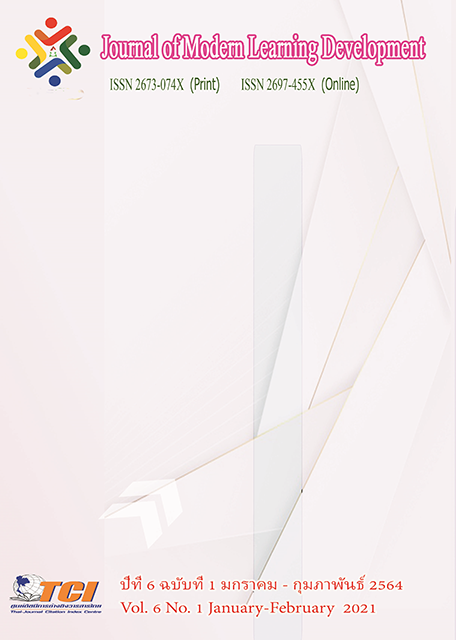English Vocabulary Learning by Smartphones of Chinese EFL Learners in Thailand
Main Article Content
Abstract
Vocabulary acquisition is essential in the process of English learning. Word knowledge is based on three interrelated aspects (form, meaning, and use), and each aspect incorporates both a receptive and productive dimension. The increasing use of smartphones is starting to influence how students learn and, in particular, how students acquire vocabulary in foreign language learning. Learning vocabulary by using smartphones exceeds classroom learning limitations, enhances communication and interaction between teachers and students, and brings a new platform to college English learning modes in an online environment, particularly during the Covid-19 pandemic. This study investigates the use of smartphones by Chinese students in learning English vocabulary aspects (form, meaning, and use) both receptively and productively. One hundred and thirty Chinese EFL students studying in Thailand participated in an online questionnaire and interview. The findings showed that Chinese EFL participants used smartphones to learn different word knowledge aspects at different speeds. Specifically, participants often used smartphones to learn word form first, followed by the word meaning and, finally, word use. Furthermore, through smartphones, the recognition of a word often occurs before the production of the word. The current study also showed that Chinese EFL participants held a highly positive attitude towards smartphones in vocabulary learning.
Article Details
References
Ajisoko, P. (2020). The Use of Duolingo Apps to Improve English Vocabulary Learning. International Journal of Emerging Technologies in Learning (iJET), 15 (07), 149-155.
Alhabahba, M. M., Mahfoodh, O. H., Pandian, A., Mohammad, Y. M., Ahmed, E. W., Albdour, A., & Al Bazar, H. (2014). Check This Word Out! Exploring the Factors That Affect Students’ Vocabulary Learning Using Smartphones via Partial Least Squares. Education Research International.
Chen Hsieh, J. S., Wu, W. C. V., & Marek, M. W. (2017). Using the flipped classroom to enhance EFL learning. Computer Assisted Language Learning, 30 (1/2), 1-21.
Dörnyei, Z. (2007). Research methods in applied linguistics. Oxford, UK: Oxford University Press.
Hu, Z. (2013). Vocabulary Learning Assisted by Mobile Phones: Perceptions of Chinese Adult Learners. Journal of Cambridge Studies, 8 (1), 139-154.
Jiang, H. (2017). Research on the application of mobile learning in college English vocabulary
learning. Overseas English.
Kukulska-Hulme, A. & Shield, L. (2008). An overview of mobile-assisted language learning: from content delivery to supported collaboration and interaction. ReCALL, 20 (03), 271-289.
Lei, Z. M. (2018). Vocabulary Learning Assisted with Smart Phone Application. Theory and Practice in Language Studies, 8 (11), 1511-1516.
Liu, CH. (2017). Application of Mobile Phones Apps in College English Vocabulary Learning--A case of Bai Cizhan. : Online. Retrieved November 3, 2020. from: http://cdmd. cnki. com.cn/Article/CDMD-10736-1017191326.htm
Ma, X. X. & Yodkamlue, B. (2019). The Effects of Using a Self-developed Mobile App on Vocabulary Learning and Retention among EFL Learners. PASAA, 58, 166-205
Nation, I. S. P. (2013). Learning vocabulary in another language (2ed). Cambridge: Cambridge University Press.
Reinders, H., White, C. (2011). Special issue commentary : Learner autonomy and new learning environments. Language Learning & Technology. 15 (3), 1-3.
Rezaei, A., Mai, N., & Pesaranghader, A. (2014). The effect of mobile applications on English vocabulary acquisition. Jurnal Teknologi, 68 (2), 73-83.
Schmitt, N. (2010). Researching vocabulary: A vocabulary research manual. Springer.
Subramaniam, G. K. J., & Harun, R. N. S. R. (2013). Adoption of mobile technology in higher education: students’ perceptions of English language learning using smartphones. International Journal of Asian Social Science, 3 (9), 2084-2089.
Sukying, A. (2017). The relationship between receptive and productive affix knowledge and vocabulary size in an EFL Context. PhD. Dissertation, School of Education and Social Work, University of Sydney, Sydney.
Sukying, A. (2018). Investigating receptive and productive affix knowledge in EFL learners. In D. Hirsh (Ed.), Explorations in second language vocabulary research. Bern: Peter Lang.
Sukying, A. (2020). Word Knowledge through Morphological Awareness in EFL Learners. TESOL International Journal, 15 (1), 74-85.


